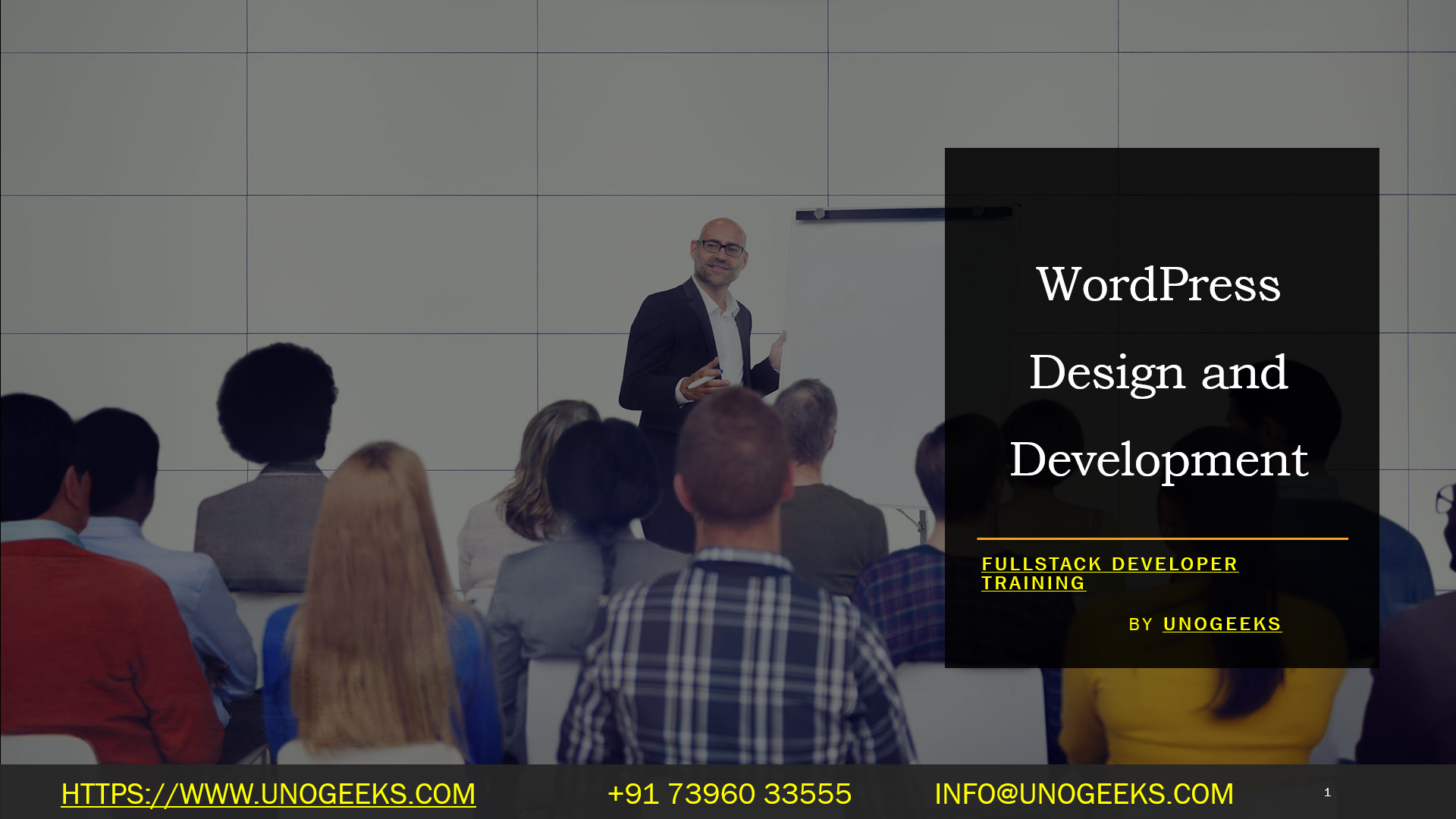WordPress Design and Development
WordPress Design and Development
WordPress is a popular content management system (CMS) that allows you to create and manage websites easily. Designing and developing a WordPress website involves several key steps and considerations. Here’s a comprehensive guide to WordPress design and development:
Step 1: Planning and Preparation
- Define Your Goals: Determine the purpose and goals of your website. Are you creating a blog, e-commerce site, portfolio, or business website?
- Choose a Domain: Select a domain name that reflects your brand or website’s content.
- Select Hosting: Choose a reliable web hosting provider that supports WordPress.
- Install WordPress: Install WordPress on your hosting server using one-click installers or manual installation.
Step 2: Design and Layout
- Select a Theme: Choose a WordPress theme that aligns with your website’s purpose and design preferences. You can find free and premium themes in the WordPress theme repository.
- Customize the Theme: Modify the theme’s appearance and layout using the WordPress Customizer. Customize colors, fonts, header/footer, and widgets.
- Create a Logo: Design a logo that represents your brand and upload it to your site.
- Page and Content Structure: Plan the structure of your website, including pages, categories, and menus. Create essential pages such as the homepage, about page, contact page, and blog.
- Content Creation: Start adding content to your website, including text, images, videos, and other media. Organize content into posts and pages.
Step 3: Functionality and Plugins
- Choose Essential Plugins: Install and configure essential plugins to add functionality to your site. Examples include:
- SEO plugin (e.g., Yoast SEO)
- Contact form plugin (e.g., Contact Form 7)
- Social media sharing buttons (e.g., ShareThis)
- Caching plugin (e.g., W3 Total Cache)
- E-commerce Integration: If you’re running an online store, install an e-commerce plugin like WooCommerce to manage products, payments, and inventory.
- Security: Install a security plugin to protect your website from threats. Regularly update plugins and WordPress core to patch security vulnerabilities.
Step 4: Optimization and Performance
- Speed Optimization: Optimize your website for speed by using a caching plugin, optimizing images, and enabling browser caching.
- Mobile Responsiveness: Ensure your site is responsive and mobile-friendly by testing it on different devices.
- SEO Optimization: Optimize your content for search engines by using SEO plugins and following best practices for on-page SEO.
Step 5: Launch and Maintenance
- Testing: Test your website thoroughly for functionality, usability, and responsiveness.
- Backup: Implement a regular backup system to protect your site’s data.
- Launch: Once you’re satisfied with your website, remove any “under construction” pages, and make it live.
- Ongoing Maintenance: Continuously update WordPress, themes, and plugins to maintain security and performance. Regularly create and publish new content.
- Monitoring: Monitor your website’s analytics to track visitor behavior, traffic sources, and performance.
- Security Measures: Implement additional security measures such as a firewall, strong passwords, and two-factor authentication.
- Backup Strategy: Regularly back up your website and database to prevent data loss.
- Scale as Needed: As your website grows, consider scaling your hosting plan or optimizing server resources.
- User Support: Provide user support through contact forms or live chat if needed.
WordPress design and development require a combination of creativity, technical skills, and ongoing maintenance. It’s essential to keep your website up to date, secure, and user-friendly to provide a positive user experience and achieve your online goals.
Full Stack Developer Training Demo Day 1 Video:
Conclusion:
Unogeeks is the No.1 IT Training Institute for Full Stack Developer Training. Anyone Disagree? Please drop in a comment
You can check out our other latest blogs on Full Stack Developer Training here – Full Stack Developer Blogs
Please check out our Best In Class Full Stack Developer Training Details here – Full Stack Developer Training

———————————-
For Training inquiries:
Call/Whatsapp: +91 73960 33555
Mail us at: info@unogeeks.com
Our Website ➜ https://unogeeks.com
Follow us:
Instagram: https://www.instagram.com/unogeeks
Facebook:https://www.facebook.com/UnogeeksSoftwareTrainingInstitute
Twitter: https://twitter.com/unogeeks
